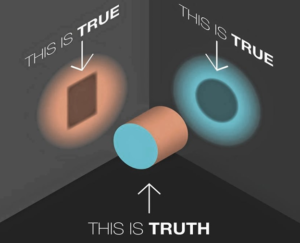There are times when you listen to something and pause because it strikes you as profound. That happened when Susan and I were watching an old episode of Madam Secretary where a reporter was writing an exclusive article about the Secretary of State and was shadowing her through a few days of her work and personal life. He attends dinner at her home, interacts with the kids, and then enters this conversation with her husband Henry who is a theologian and professor of theology at the War College in DC.
Henry McCord: “You know, I’ve read a lot of your work. You’re very good at uncovering injustice.”
Reporter: “It keeps me busy.”
Henry: “Let me ask you something. Do you ever think that sometimes you find dishonesty and hypocrisy because you’ve already decided it’s there?”
Reporter: “Well, I prefer to think of my work as a search for the truth, right?”
Henry: “Well, then, as a Catholic, I would have to say we’re both searching for something elusive, unreliable, and prone to bias for a story we’d like to believe.”
I asked Susan to pause the video after exclaiming that this was profound, we rewound it several times for me to write the interchange above down. Please reread this carefully.
I think we are all searching for the truth, but how often do we remind ourselves that it is elusive, unreliable, and prone to bias? How often do we consider carefully the testimonies of so many in the world, in our lives, and within ourselves and admit that we see through a mirror dimly as the apostle Paul says and that we are looking at the knotted side of the tapestry in Corrie Ten Boom’s model of life’s mysteries.
Social media coupled with AI are feeding us things that we want to see and hear. The result may be good for the marketers and politicians behind these actions, but they are driving us away from carefully listening to one another.
Shiny pennies grab our attention. Clickbait makes us click on things that are not what they were claimed to be. Our attention spans are shrinking as we are bombarded by messaging specifically designed to capture our time online. I’d like to believe that a pill would restore my hair, flexibility, and strength of my younger years. It is hard to resign yourself to the reality that stories about that are false.
We should be approaching each day with a special sensitivity to those with whom we have important relationships. And as we face it with our eyes and ears wide open, we should be wise like Henry recognizing our limits to know the truth even though we seek it intensely.
For those of you who want an excellent explanation of the root problem, please take a close look at the graphic at the beginning of this blog which has two lights shining on a cylinder in such a way that one wall appears to show it as a square and the other as a circle. Both views are true, but the best insights come when you step back and see the whole picture. (And a bonus question for the geeks out there … email me and tell me what the true color is for the cylinder itself?)
The key to better conversations seems to rely on humility and a sincere interest in learning more by listening. I was struck by a recent Frank Bruni article in the New York Times and the author of the book “The Age of Grievance.” This snippet from the Times says it all in my humble opinion:
“And I’m going to repeat one phrase more often than any other: ‘It’s complicated.’ They’ll become familiar with that. They may even become bored with it. I’ll sometimes say it when we’re discussing the roots and branches of a social ill, the motivations of public (and private) actors and a whole lot else, and that’s because I’m standing before them not as an ambassador of certainty or a font of unassailable verities but as an emissary of doubt. I want to give them intelligent questions, not final answers. I want to teach them how much they have to learn — and how much they will always have to learn.”
I hope this holiday season offers you many opportunities to savor the elusive, unreliable, and biased world all around us as we remind ourselves once again of the “reason for the season.”

As always you wax elegantly.
I would say the cylinder is white otherwise the two light sources would not look the same on the cylinder and the walls.
Thanks Roger. I always appreciate your feedback.
Yes, you are right … the cylinder has to be white which is the presence of all colors so that it can appear to be the color of the light source.